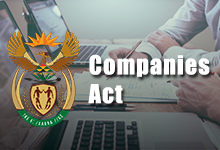|
|
|
|
|
|
 |
|
Important Tax Deadlines To Remember
|
- 31 January 2019: Individual provisional taxpayers and Trusts 2018 tax returns
- 28 February 2019: Companies, Close Corporations with February year ends 2018 tax returns
- 28 February 2019: 2019 second provisional tax estimates and payments for provisional individual taxpayers, Companies, Close Corporations and Trusts with February year ends
Please remember to check your odometer reading at 28 February 2019 for tax purposes if you receive a travel allowance.
ADMINISTRATIVE PENALTIES FOR CORPORATE INCOME TAX (CIT) TO BE IMPOSED
SARS will be imposing administrative penalties from December 2018 for outstanding Company tax returns. Previously, only outstanding personal income tax returns were subject to the imposition of penalties.
The penalties range from R250 to R16 000 per month that non-compliance continues, per outstanding return, depending on a company’s assessed loss or taxable income
To prevent the imposition of these non-compliance penalties any outstanding company tax returns need to be submitted before the end of November 2018.
Company income tax returns must be submitted within 12 months from the date on which its financial year ends. A dormant company is required to submit any outstanding returns prior to 2018 to prevent a penalty being imposed.
The criteria for the exception in 2018 are set out in Notice 600 of 15 June 2018, which is available on the SARS website.
DEBT COLLECTION AGENCIES ASSISTING SARS TO COLLECT OUSTANDING TAXES
SARS has appointed eight external debt collection agencies to collect outstanding taxes. The contract is in effect until 28 February 2019.
The agencies that have been appointed are:
- CSS Credit Solution Services (Pty) Ltd
- ITC Business Administrators (Pty) Ltd
- Medaco Capital Services (Pty) Ltd
- New Integrated Credit Solutions (Pty) Ltd
- Norman Bisset & Associates Group (Pty) Ltd
- Revenue Consulting (Pty) Ltd
- Transactional Capital Recoveries (Pty) Ltd
- Van De Venter Mojapelo (Pty) Ltd.
If you receive a phone call from either of these collection agencies, please inform us in order to take this matter further.
FOREIGN INVESTMENT ALLOWANCE
In terms of South African Reserve Bank Exchange Control, South African residents are entitled to two allowances per calendar year:
- R1 million discretionary allowance (DA) – this allowance may be used for foreign investment without having to obtain tax clearance (a tax number is required), as well as; travel, gifts, loans, studies and alimony.
- R10 million foreign Investment allowance (FIA) – this allowance can be used to invest funds overseas and requires the applicant to have a green bar coded South African ID book and to obtain tax clearance from South African Revenue Services (SARS) before proceeding.
The application can be done through e-Filing by submitting an application form and supporting documentation/information.
CUSTOMS REQUIREMENTS FOR SOUTH AFRICAN TRAVELLERS
(the below is from SARS’ Media Release on 24 May 2018)
The South African Revenue Service (SARS) would like to clarify a recent confusion in the media about Customs requirements for travellers returning to South Africa with personal valuables.
In terms of Customs legislation, South African residents travelling abroad are not required to declare their personal effects when leaving the country, nor upon return. “Personal effects” is defined in legislation as including items such as personal laptops, iPads, cellphones, golf clubs, cameras and/or other high value items forming part of the traveller’s possessions when leaving the country.
Based on these provisions, no traveller can be penalised for not declaring or registering their personal effects upon leaving the country. However, upon return to South Africa, the traveller may be challenged by a Customs officer to provide proof of local purchase or ownership. It is within the mandate of the Customs Officer to establish whether the goods fit the description of “New or Used goods acquired whilst abroad” which would have a duty implication and, if not declared, also a penalty implication. The proof referred to above may be in the form of an invoice, an insurance record, in the case of a laptop even the content on the laptop, and any other means through which the officer can use his discretionary powers to satisfy that proof.
The alternative to providing such proof is a process created within the policy framework called “Registration for Re-importation”. This is not on a DA65 as many media articles have referred to lately. The DA65 was phased out for travellers many years ago and today it is only used within the commercial cargo environment, for example where goods are temporarily exported for repair abroad.
A more user-friendly and secure process has been created where the traveller completes a TC-01 (Traveller Card) notifying his or her intent to register goods for re-importation. This is presented to the Customs Officer who will then capture this online on a Traveller declaration system (TRD1). The traveller authenticates the declaration by signing on a digital signature pad. A copy is printed for the traveller to retain as proof of registration.
Following this process saves the traveller the burden of having to be questioned on their personal effects when they return. If the traveller is a frequent traveller, this process remains valid for six months.
Where the officer is not satisfied that proof of local purchase or ownership can be established, the officer will advise the traveller that the item(s) will be detained until such proof can be presented. Alternatively, duty and VAT is charged and penalties possibly imposed for non- or false declaration in the event that the traveller has no proof. The traveller can also choose to pay a security amount to cover duty and VAT, in the event that he or she wants to retain the item. This amount is refunded to the traveller once the proof of local purchase or ownership is presented to Customs.
As a result of recent incidents, Customs has reinforced its internal processes by providing practice guidelines to front-line staff. In addition, travellers are advised to follow the procedure outlined above in order to avoid the inconvenience of having to explain ownership upon returning from travel abroad.
OFFICE NEWS
We say goodbye to Nadine Solomons in our Accounting Department. We wish her all of the best for her future plans and we thank her for her commitment and hard work.
|
|
|
 |
|
 |
|
Let’s Be Realistic and Positive in 2019
|

|
2018 has certainly presented us South Africans with some major challenges. But as we start winding down and reflecting on what the future has in store for us, let’s be sure to keep in mind the many positives we take into the New Year with us.
So join us in looking at some of the “big problems” we face, and in asking whether they are in fact as insoluble as we tend to think.
The bottom line is this - how can we make meaningful inroads into our problems, and how do we ensure that 2019 is a year of positivity and recovery for us all? Read on for some thoughts…
|
| |
|
|
 |
|
 |
|
Taxpayers Note: How To Upload Supporting Documents Using eFiling
|

|
If you use eFiling, you may have run into issues when trying to upload your supporting documents.
We share with you SARS’ official instructions on what documents you can upload - the size and number limits, the document formats supported, the way to scan documents for acceptability, and so on.
We list also what documents and formats you can’t upload, and what to do if you get a message like “The document cannot be converted”.
|
| |
|
|
 |
|
 |
|
The Medium Term Budget Speech and the Rating Agencies – Danger in December
|

|
What is the Medium Term Budget Speech, why is it important, and what are our big challenges?
We address those issues in the context of both the “President’s Plan” and the fact that this month ratings agency Moody’s will announce its decision on whether or not to downgrade South Africa to outright junk status.
It’s important for all of us to understand both how likely a downgrade is, and what will happen to our economy if things go badly for us in December.
|
| |
|
|
 |
|
 |
|
Changes Are Coming to The Companies Act – Be Ready for Them
|

|
The Companies Act is set for some major changes, and although the Companies Amendment Bill 2018 is still at the “comment” stage, there are some important changes proposed that you should know about. And, if they might affect your business meaningfully in any way, you should start right now on preparing for them and on taking professional advice as to their likely impact on you and your business.
We list five of the more significant proposals, with comments on their practical effect on companies, directors and prescribed officers.
If you run a company (in any capacity), or hold shares in one, read on…
|
| |
|
|
 |
|
 |
|
Is SARS Attacking Your Medical Tax Credit?
|

|
None of us wants to pay a cent more in income tax than we are legally obliged to, so allowances and rebates like the Medical Tax Credit are always welcome.
Taxpayers with disabilities or disabled dependants, pensioners, and those in the lower income brackets are particularly likely to rely on being allowed significant credits.
The problem is that suddenly SARS is starting to query these credits. We analyse the extent of the problem, how and why it has arisen, and what you should do to avoid these queries in the future.
|
| |
|
|
 |
|
|

|
|
Thank you for your support in 2018.
Have a Wonderful Festive Season, and a Happy and Prosperous 2019.
Enjoy the Break!
|
|
| |
|
|
|
|
|
|

|
|
Disclaimer
|
The information provided herein should not be used or relied on as professional advice. No liability can be accepted for any errors or omissions nor for any loss or damage arising from reliance upon any information herein. Always contact us for professional, detailed and appropriate advice.
|
|
© DotNews. All Rights Reserved.

|
A Client Connection Service by
DotNews |
|
|
|
|